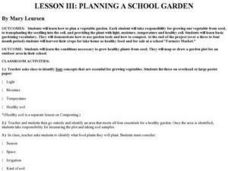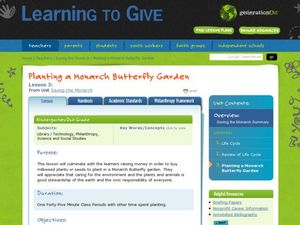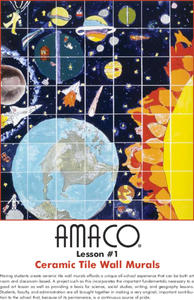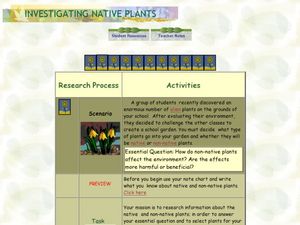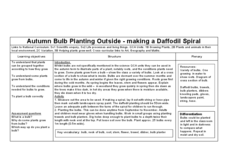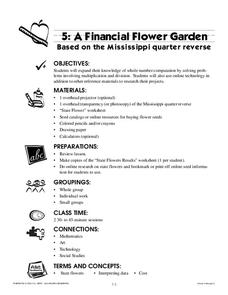Curated OER
Lesson: A Garden Party of My Own
Kids look at a beautiful work of art to practice grammar, make connections from life to art, and sketching. They identify all the parts of grammar they see in the image, discuss what they see and do on a picnic, and then draw an imaged...
Captain Planet Foundation
Rotting Away
What happens at the end of a plant's life cycle? Show kids the natural way that plants show that they're decomposing, as well as the importance of compost, with a lesson about living organisms. After reading Log Cabin by Anne Schreiber,...
Curated OER
Planning A School Garden
Learners discover how to plan a vegetable garden. Each student take responsibility for growing one vegetable from seed, to transplanting the seedling into the soil, and providing the plant with light, moisture, temperature and healthy soil.
Curated OER
Planting a Monarch Butterfly Garden
Students raise money to purchase milkweed plants for their butterfly garden. In this gardening lesson, students listen to the story Miss Rumphius to determine why it is important to plant milkweed for butterflies. Students develop a...
Baylor College
Needs of Plants
What better way to learn about plant life than by creating a class garden? Young botanists start with a brief discussion about radishes before planting seeds and watching them grow. To determine the importance of water, sunlight, and...
Kenan Fellows
Sustainability: Learning for a Lifetime – Soil
Do great gardeners really have green thumbs—or just really great soil? Environmental scholars discover what makes Earth's soil and soil quality so important through research and experimentation. Learners also develop an understanding of...
American Art Clay Co., Inc.
Ceramic Tile Wall Murals
Science, social studies, language arts, and art classes work together with administrators to produce a permanent, ceramic tile wall mural to install at their school.
Curated OER
Add'm and Eve in the Garden
Young scholars research and design five different shaped raised beds for the school garden. In small groups, they conduct Internet research, measure and create a cost analysis for the construction and design, and submit their plans to...
Curated OER
Botanical Gardens Lesson Plan
Students define botanical gardens and explain why they are important. They describe a plant using scientific ways.
Curated OER
Aztec Floating Gardens
Aztecs created amazing hydroponic gardens called Chinampas, to grow their crops. Learners in grades k-7 engage in four mini-experiments to understand just how amazing floating gardens are. Tip: A perfect way to bring science into your...
Curated OER
Six of One, Half Dozen of the Other
Learners explore the garden with all five senses. For this Science lesson, students collect specimens from the garden to classify. Learners use adjectives to describe the objects collected.
Curated OER
Food Labels
Students study Nutrition Facts labels. In this life science lesson, students explore Nutrition Facts labels, then determine and analyze the nutrients found in a variety of foods. Additionally students construct bug boxes used to collect...
Curated OER
Investigating Native Plants
Students explore Earth science by participating in a gardening activity. In this botany lesson, students discuss a group of non-native plants that would grow well in a school garden. Students complete a plant science graphic organizer...
Curated OER
Autumn Bulb Planting Outside - Making a Daffodil Spiral
Students plant daffodil bulbs. In this gardening activity, students work outside to plant daffodil bulbs in the autumn so that they can grow roots and emerge by spring.
New York City Department of Education
Chris’ Garden Dilemma
Make the connections between area, tiling, and multiplication. A performance task and associated unit presents the concept of area and makes the connection to multiplication. Pupils work through three major sections of instruction that...
ESL Kid Stuff
Vegetables
Help your learners exercise healthy eating habits with a series of activities about vegetables. Kids learn about common vegetables with songs, matching games, flashcards, and crafts.
August House
Stone Soup
Sharing and cooperation are difficult skills for kindergartners to grasp. Using the story Stone Soup and a series of activities, kids learn about the benefits of working together, categorizing and comparing items, and eating healthy foods.
Curated OER
Rationing in WWII
What was life like in Britain during World War II? Discover how England used rationing to encourage conservation during a time of war. Learners will see images of actual ration books and read how people used them to buy clothes, food,...
Curated OER
Mississippian Gardens
Students research and plan a Mississippian garden. In this Native American history lesson, students work in groups to research crops used by Native Americans in the Mississippian Period and use the information to plan and create an...
Curated OER
Exploring Archaeology and Trade in the Middle School Latin Class
Students in a Latin class focus on archeology and trade from the Hellenistic period through the Middle Ages. In groups, they read various stages of a primary source documents in which they discuss and answer questions. To end the lesson,...
Produce for Better Health Foundation
From Grapes to Raisins
How do you make raisins? Do a simple experiment with your class that prompts them to set a bunch of grapes in the sun for a few days, and see what they find!
Curated OER
A Financial Flower Garden
Here is another in the interesting series of lessons that use the special State Quarters as a learning tool. This one uses the Mississippi State Quarter. During this lesson plan, pupils learn about the variety of state flowers that...
Virginia Department of Education
Photosynthesis and Cellular Respiration
Provide high schoolers with their own indoor gardens! Emerging scientists discuss the process of photosynthesis and germinate seeds before growing plants in multiple lighting conditions. The hands-on application allows pupils to see...
Curated OER
We Garden: My Life as a Fruit or Vegetable
Learners explore agriculture by participating in a role-play activity. In this farm to fork lesson, students ask and answer questions as though they were a specific plant about to be eaten. Learners write responses to critical thinking...




